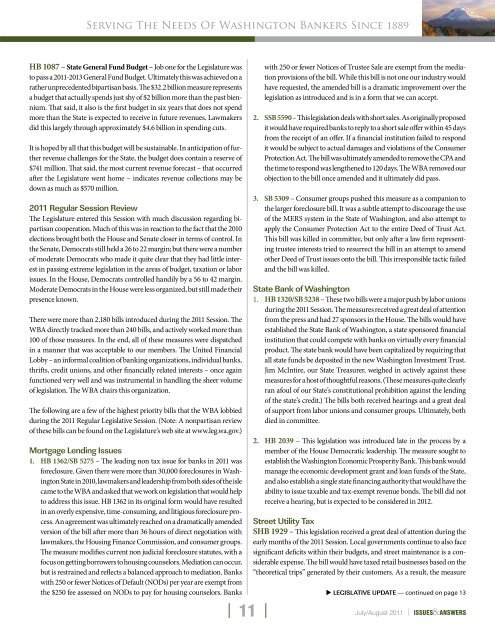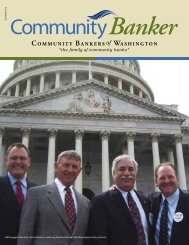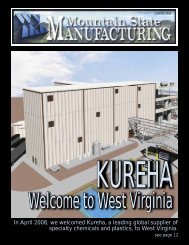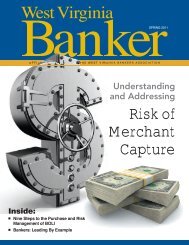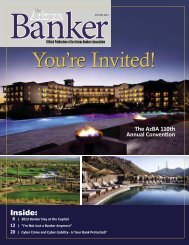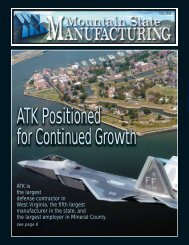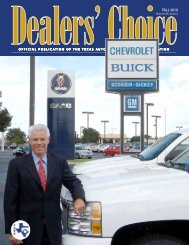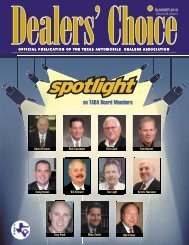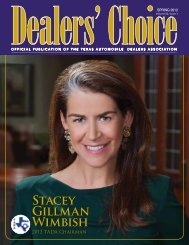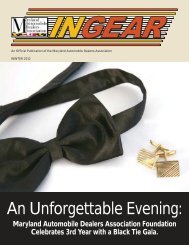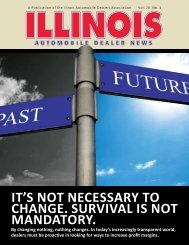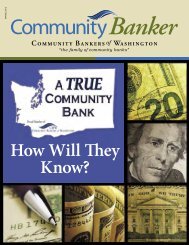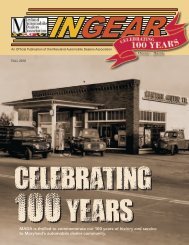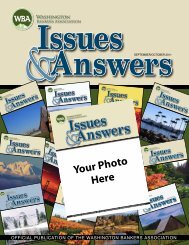official publication of the washington bankers association - Media ...
official publication of the washington bankers association - Media ...
official publication of the washington bankers association - Media ...
Create successful ePaper yourself
Turn your PDF publications into a flip-book with our unique Google optimized e-Paper software.
Serving The Needs Of Washington Bankers Since 1889<br />
HB 1087 – State General Fund Budget – Job one for <strong>the</strong> Legislature was<br />
to pass a 2011-2013 General Fund Budget. Ultimately this was achieved on a<br />
ra<strong>the</strong>r unprecedented bipartisan basis. The $32.2 billion measure represents<br />
a budget that actually spends just shy <strong>of</strong> $2 billion more than <strong>the</strong> past biennium.<br />
That said, it also is <strong>the</strong> first budget in six years that does not spend<br />
more than <strong>the</strong> State is expected to receive in future revenues. Lawmakers<br />
did this largely through approximately $4.6 billion in spending cuts.<br />
It is hoped by all that this budget will be sustainable. In anticipation <strong>of</strong> fur<strong>the</strong>r<br />
revenue challenges for <strong>the</strong> State, <strong>the</strong> budget does contain a reserve <strong>of</strong><br />
$741 million. That said, <strong>the</strong> most current revenue forecast – that occurred<br />
after <strong>the</strong> Legislature went home – indicates revenue collections may be<br />
down as much as $570 million.<br />
2011 Regular Session Review<br />
The Legislature entered this Session with much discussion regarding bipartisan<br />
cooperation. Much <strong>of</strong> this was in reaction to <strong>the</strong> fact that <strong>the</strong> 2010<br />
elections brought both <strong>the</strong> House and Senate closer in terms <strong>of</strong> control. In<br />
<strong>the</strong> Senate, Democrats still held a 26 to 22 margin; but <strong>the</strong>re were a number<br />
<strong>of</strong> moderate Democrats who made it quite clear that <strong>the</strong>y had little interest<br />
in passing extreme legislation in <strong>the</strong> areas <strong>of</strong> budget, taxation or labor<br />
issues. In <strong>the</strong> House, Democrats controlled handily by a 56 to 42 margin.<br />
Moderate Democrats in <strong>the</strong> House were less organized, but still made <strong>the</strong>ir<br />
presence known.<br />
There were more than 2,180 bills introduced during <strong>the</strong> 2011 Session. The<br />
WBA directly tracked more than 240 bills, and actively worked more than<br />
100 <strong>of</strong> those measures. In <strong>the</strong> end, all <strong>of</strong> <strong>the</strong>se measures were dispatched<br />
in a manner that was acceptable to our members. The United Financial<br />
Lobby – an informal coalition <strong>of</strong> banking organizations, individual banks,<br />
thrifts, credit unions, and o<strong>the</strong>r financially related interests – once again<br />
functioned very well and was instrumental in handling <strong>the</strong> sheer volume<br />
<strong>of</strong> legislation. The WBA chairs this organization.<br />
The following are a few <strong>of</strong> <strong>the</strong> highest priority bills that <strong>the</strong> WBA lobbied<br />
during <strong>the</strong> 2011 Regular Legislative Session. (Note: A nonpartisan review<br />
<strong>of</strong> <strong>the</strong>se bills can be found on <strong>the</strong> Legislature’s web site at www.leg.wa.gov.)<br />
Mortgage Lending Issues<br />
1. HB 1362/SB 5275 – The leading non tax issue for banks in 2011 was<br />
foreclosure. Given <strong>the</strong>re were more than 30,000 foreclosures in Washington<br />
State in 2010, lawmakers and leadership from both sides <strong>of</strong> <strong>the</strong> isle<br />
came to <strong>the</strong> WBA and asked that we work on legislation that would help<br />
to address this issue. HB 1362 in its original form would have resulted<br />
in an overly expensive, time-consuming, and litigious foreclosure process.<br />
An agreement was ultimately reached on a dramatically amended<br />
version <strong>of</strong> <strong>the</strong> bill after more than 36 hours <strong>of</strong> direct negotiation with<br />
lawmakers, <strong>the</strong> Housing Finance Commission, and consumer groups.<br />
The measure modifies current non judicial foreclosure statutes, with a<br />
focus on getting borrowers to housing counselors. <strong>Media</strong>tion can occur,<br />
but is restrained and reflects a balanced approach to mediation. Banks<br />
with 250 or fewer Notices <strong>of</strong> Default (NODs) per year are exempt from<br />
<strong>the</strong> $250 fee assessed on NODs to pay for housing counselors. Banks<br />
11<br />
with 250 or fewer Notices <strong>of</strong> Trustee Sale are exempt from <strong>the</strong> mediation<br />
provisions <strong>of</strong> <strong>the</strong> bill. While this bill is not one our industry would<br />
have requested, <strong>the</strong> amended bill is a dramatic improvement over <strong>the</strong><br />
legislation as introduced and is in a form that we can accept.<br />
2. SSB 5590 – This legislation deals with short sales. As originally proposed<br />
it would have required banks to reply to a short sale <strong>of</strong>fer within 45 days<br />
from <strong>the</strong> receipt <strong>of</strong> an <strong>of</strong>fer. If a financial institution failed to respond<br />
it would be subject to actual damages and violations <strong>of</strong> <strong>the</strong> Consumer<br />
Protection Act. The bill was ultimately amended to remove <strong>the</strong> CPA and<br />
<strong>the</strong> time to respond was leng<strong>the</strong>ned to 120 days. The WBA removed our<br />
objection to <strong>the</strong> bill once amended and it ultimately did pass.<br />
3. SB 5309 – Consumer groups pushed this measure as a companion to<br />
<strong>the</strong> larger foreclosure bill. It was a subtle attempt to discourage <strong>the</strong> use<br />
<strong>of</strong> <strong>the</strong> MERS system in <strong>the</strong> State <strong>of</strong> Washington, and also attempt to<br />
apply <strong>the</strong> Consumer Protection Act to <strong>the</strong> entire Deed <strong>of</strong> Trust Act.<br />
This bill was killed in committee, but only after a law firm representing<br />
trustee interests tried to resurrect <strong>the</strong> bill in an attempt to amend<br />
o<strong>the</strong>r Deed <strong>of</strong> Trust issues onto <strong>the</strong> bill. This irresponsible tactic failed<br />
and <strong>the</strong> bill was killed.<br />
State Bank <strong>of</strong> Washington<br />
1. HB 1320/SB 5238 – These two bills were a major push by labor unions<br />
during <strong>the</strong> 2011 Session. The measures received a great deal <strong>of</strong> attention<br />
from <strong>the</strong> press and had 27 sponsors in <strong>the</strong> House. The bills would have<br />
established <strong>the</strong> State Bank <strong>of</strong> Washington, a state sponsored financial<br />
institution that could compete with banks on virtually every financial<br />
product. The state bank would have been capitalized by requiring that<br />
all state funds be deposited in <strong>the</strong> new Washington Investment Trust.<br />
Jim McIntire, our State Treasurer, weighed in actively against <strong>the</strong>se<br />
measures for a host <strong>of</strong> thoughtful reasons. (These measures quite clearly<br />
ran afoul <strong>of</strong> our State’s constitutional prohibition against <strong>the</strong> lending<br />
<strong>of</strong> <strong>the</strong> state’s credit.) The bills both received hearings and a great deal<br />
<strong>of</strong> support from labor unions and consumer groups. Ultimately, both<br />
died in committee.<br />
2. HB 2039 – This legislation was introduced late in <strong>the</strong> process by a<br />
member <strong>of</strong> <strong>the</strong> House Democratic leadership. The measure sought to<br />
establish <strong>the</strong> Washington Economic Prosperity Bank. This bank would<br />
manage <strong>the</strong> economic development grant and loan funds <strong>of</strong> <strong>the</strong> State,<br />
and also establish a single state financing authority that would have <strong>the</strong><br />
ability to issue taxable and tax-exempt revenue bonds. The bill did not<br />
receive a hearing, but is expected to be considered in 2012.<br />
Street Utility Tax<br />
SHB 1929 – This legislation received a great deal <strong>of</strong> attention during <strong>the</strong><br />
early months <strong>of</strong> <strong>the</strong> 2011 Session. Local governments continue to also face<br />
significant deficits within <strong>the</strong>ir budgets, and street maintenance is a considerable<br />
expense. The bill would have taxed retail businesses based on <strong>the</strong><br />
“<strong>the</strong>oretical trips” generated by <strong>the</strong>ir customers. As a result, <strong>the</strong> measure<br />
LEGISLATIVE UPDATE — continued on page 13<br />
July/August 2011 ⏐


